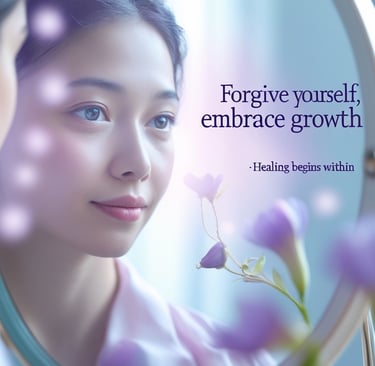How to forgive to release emotions and regain peace? Does forgiveness really help with harmony?
Forgiveness is key to releasing emotions and regaining emotional harmony. Understand why it's worth letting go of grudges and how to forgive others and yourself. Discover effective methods and exercises to release the past and achieve inner peace. Learn how to cope with emotions and build healthy relationships through the practice of gratitude and personal development.
4/6/20256 min read


How Forgiveness Helps Release Emotions and Regain Harmony?
Introduction
In today's dynamic world, full of challenges and inevitable hurts, the ability to cope with difficult emotions becomes crucial for our mental well-being. One of the most powerful tools we have at our disposal is forgiveness. Often seen as an act of grace towards others, it is, in reality, primarily a gift we offer ourselves. Forgiveness is not only a release from the negative feelings associated with past hurts but also a path to regaining inner balance and emotional harmony. As an experienced copywriter and blogging expert with 10 years of SEO experience, I want to delve into this topic, based on the E-A-T model (Expertise, Authoritativeness, Trustworthiness), to show how forgiveness can become the foundation of our personal development and the key to building healthy relationships.
In this article, we will answer fundamental questions about forgiveness: why is it so important for our emotional freedom, how to effectively forgive others and ourselves, and what specific exercises can help us release the past and regain the desired lightness of spirit. Our goal is to provide you with practical tips that will allow you to understand the power of forgiveness and implement it in your life, leading to greater inner peace and satisfaction.
Why is Forgiveness Key to Emotional Freedom?
Holding onto hurt and anger is like carrying a heavy backpack full of stones. With each passing day, it becomes heavier, burdening our thoughts, emotions, and body. These negative emotions not only poison our present but also affect our future, preventing us from fully enjoying life and building satisfying relationships. Why is forgiveness key to emotional freedom? The answer is simple: because forgiveness takes that weight off our shoulders.
When we cannot forgive, we become prisoners of the past. Our thoughts constantly revolve around the hurt we experienced, stirring up frustration, regret, and even hatred. These negative emotions consume our psychic energy, make it difficult to concentrate, lower our mood, and can lead to serious health problems such as stress, insomnia, and even heart disease. Forgiveness is an act of self-liberation. It allows us to detach ourselves from the negative influence of the past and direct our energy towards building a better future.
The emotional freedom achieved through forgiveness allows us to:
Release negative emotions: Anger, regret, frustration – these feelings poison our lives. Forgiveness allows us to process and let them go.
Regain inner peace: When we stop fighting the past, we gain inner harmony and quiet. Inner peace is the foundation of a happy life.
Improve relationships with others: Unforgiven hurts often lead to conflicts and broken bonds. Forgiveness opens the way to healing relationships and building new ones based on trust and understanding.
Increase energy levels: Releasing negative emotions also frees up our energy, which we can use to pursue our goals and passions.
Improve mental and physical health: Chronic stress associated with unforgiveness has a negative impact on our health. Forgiveness contributes to lowering stress levels and improving overall well-being.
Forgiveness does not mean forgetting what happened or justifying the hurtful behavior. Rather, it means making a conscious decision not to allow the past to continue controlling our present and future. It is an act of strength, not weakness.
How to Forgive Others and Yourself – Effective Methods
The process of forgiveness is not always easy and often requires time and effort. However, there are effective methods that can help us with this. How to forgive others and yourself? Here are some proven strategies:
How to forgive others:
Understand the perspective: Try to look at the situation from the perspective of the person who hurt you. Consider what their motives might have been, even if you don't accept them. Empathy can help soften anger.
Acknowledge your emotions: Don't downplay your feelings. Allow yourself to experience the pain, anger, or sadness. Acknowledging and accepting your own emotions is the first step towards releasing them.
Communication (optional): Sometimes, talking to the person who hurt us can be helpful in the process of forgiveness. Expressing your feelings and listening to the other person's perspective can lead to mutual understanding and healing of the relationship. However, remember that this is not always possible or advisable.
Focus on the present: Stop dwelling on the past. Focus on what you can control now. Your current thoughts and actions have the greatest impact on your well-being.
Practice compassion: Even if you don't agree with someone's behavior, you can try to show them compassion. Remember that each of us makes mistakes and struggles with our own problems.
Make the decision to forgive: Forgiveness is a conscious decision. Decide that you no longer want to be a prisoner of hurt. You control your emotions, not the person who hurt you.
Release expectations: Sometimes, the difficulty in forgiving stems from our unrealistic expectations of others. Accept that people are different and will not always act the way we want them to.
How to forgive yourself:
Forgiving yourself is just as important, and often even more difficult, than forgiving others. We all make mistakes and make decisions we later regret. Sometimes we ourselves are our harshest judge. How to forgive yourself?
Acknowledge your mistakes: Admit your mistakes and accept that you are only human. Everyone has the right to make mistakes.
Show yourself compassion: Treat yourself with the same understanding and kindness you show others. Don't criticize yourself too harshly.
Draw conclusions: Instead of dwelling on your mistakes, think about what you can learn from them. How can you act differently in the future?
Repair the damage (if possible): If your actions have hurt someone, try to make amends. Apologize, make restitution. This can help you feel better about yourself.
Allow yourself to make mistakes: Accept that mistakes are part of the learning and personal development process. Not perfectionism, but continuous improvement is the key to success and happiness.
Focus on your strengths: Instead of focusing on your weaknesses and mistakes, remind yourself of your achievements and positive qualities.
Practice self-acceptance: Accept yourself as you are, with all your strengths and weaknesses. The practice of gratitude for what you value in yourself can be very helpful.
Exercises to Release the Past and Regain Lightness
Forgiveness is not only a mental process but also an emotional and spiritual one. Regularly performing exercises can help us release the past and regain the desired lightness of spirit. Here are a few suggestions:
Forgiveness meditation: Find a quiet place, sit comfortably, and close your eyes. Focus on your breath. Then, imagine the person you want to forgive. Repeat silently or aloud: "I forgive you. I release you. I release myself." Feel the negative emotions leaving your body. You can also visualize the bonds connecting you to that person loosening and breaking.
Writing letters: Write a letter to the person you want to forgive, describing your feelings and how their actions affected you. You don't have to send this letter. Just writing down your emotions can be very cleansing. You can also write a letter to yourself in which you forgive yourself for your own mistakes.
The "Letting Go" technique: Imagine you are holding a symbol of your hurt in your hand – it could be a stone, a leaf, or anything else. Feel the weight of this hurt. Then, with a deep breath, imagine letting go of this symbol, allowing it to drift away. Feel the relief and lightness.
Gratitude journal: Every evening, write down a few things you are grateful for in a journal. Focusing on the positive aspects of your life can help you reduce your focus on negative experiences and cultivate inner peace.
Affirmations: Repeat positive affirmations about forgiveness and emotional freedom daily, such as: "I am free from the past," "I forgive myself and others," "I deserve peace and happiness."
Therapy: If you have difficulty working through hurts on your own, consider seeking help from a therapist. Professional support can be invaluable in the process of forgiveness and emotional healing.
Mindfulness practice: Regularly practicing mindfulness helps us be more present in the moment and less reactive to memories from the past. It teaches us acceptance and how to cope with emotions in a healthy way.
Summary
Forgiveness is a powerful tool that can significantly improve the quality of our lives. It allows us to release emotions, regain emotional harmony, and enjoy greater inner peace. Remember that forgiveness is a process that takes time and commitment. Be patient with yourself and don't get discouraged if the beginnings are difficult. Use the methods and exercises presented, and over time you will feel the weight of the past becoming lighter, and your heart filled with emotional freedom. Investing in forgiveness is an investment in your personal development, healthy relationships, and above all – in your happiness. Start practicing forgiveness today and experience the transformative power of this gift. Remember that the practice of gratitude can further strengthen this process, helping you appreciate the present and build a positive future.
Emotions
Discover how emotions affect health.
Disclaimer
The content published on this website is for educational and informational purposes only.
The information presented:
does not constitute medical advice,
does not replace professional consultation,
is based on publicly available studies and materials,
may include references to scientific research, the proper interpretation of which requires specialized knowledge.
The authors are not medical doctors or healthcare professionals, psychology.
Affiliate Links
This website may contain affiliate links. This means that I may receive a commission for purchases made through these links — at no additional cost to you.
© 2025. All rights reserved.
